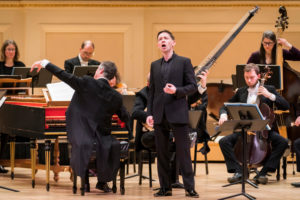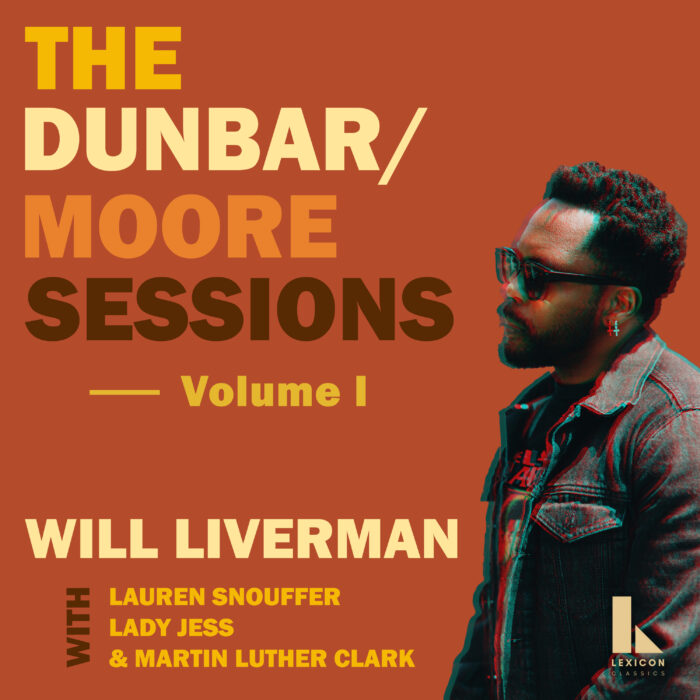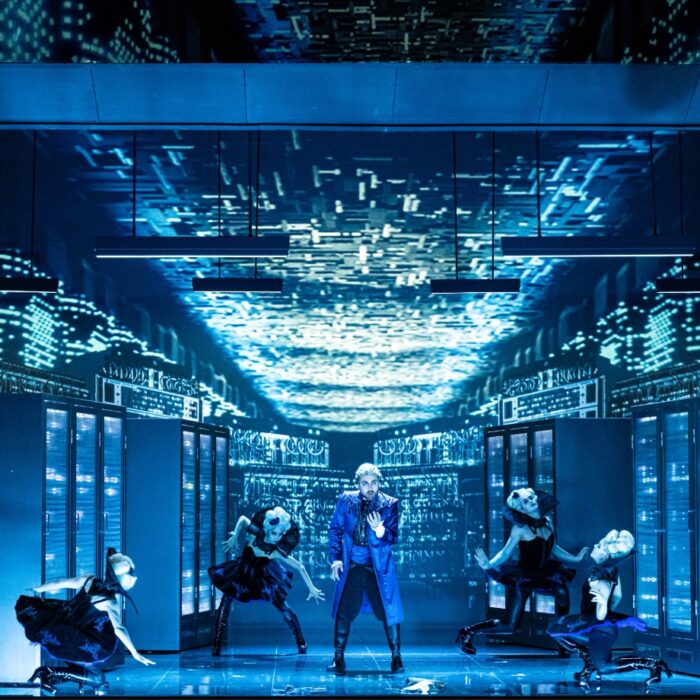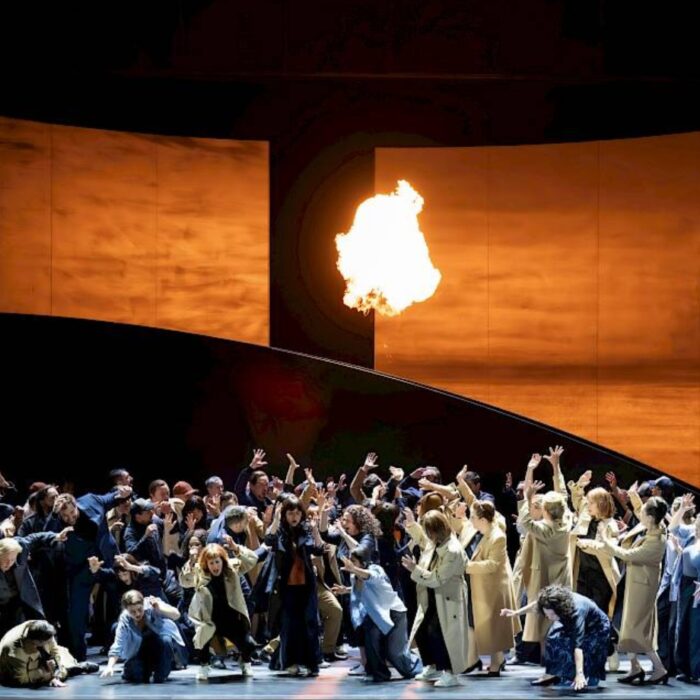
Carnegie Hall 2017-18 Review – Rinaldo: The English Concert Conquers In Hearts & Imagination in Handel Masterpiece
By David SalazarConcert performances of operas can be a rather mixed bag. The works themselves were concocted with the vision of being complete art forms and taking them out of this context can be difficult. Many operas can get away with it simply by the symphonic qualities of the music (see Wagner or Strauss).
But this can take an even more complex life of its own in a baroque opera, with its lengthy recitatives that often require soloists to carry around scores (which happened at the Carnegie Hall performance being reviewed here). Most baroque works are concocted of arias with few ensembles, forcing singers to either stand around or sit still, waiting for their moment.
This could have been an issue at Sunday afternoon’s performance of “Rinaldo” at Carnegie Hall, but it was not. Far from it.
In arguably one of the most memorable performances of any opera in 2018, The English Concert came in with a superstar cast and conquered in a big way.
A Universe of Their Own
Upon reflecting for this review, I found myself unable to find any example of such comprehensibly brilliant playing from any ensemble in any opera in recent memory. Under the confident baton of Sir Harry Bicket, every single note was a jewel, carved out with impressive craftsmanship and adoring art. You couldn’t help but marvel at the consummate beauty of every phrase, every gesture refined and polished (apologies but you might cross those two words a lot in this review).
Whether it be sopranino recorder during Almirena’s aria “Augelletti, che cantata” or the virtuosic harpsichord of Tom Foster (Bicket also played harpsichord with the ensemble on the evening) in the final aria of Act two, or the various violin solos of concertmaster Nadja Zwiener, every moment was a new adventure filled with new colors. “Rinaldo” is an opera filled with magic and in it we find some of Handel’s most inventive and magical (pun intended) moments. And listening to this interpretation at Carnegie Hall was like constantly walking through doors into an ever-expanding and arresting universe.
Two Contrasting Leads
This wasn’t just the ensemble players of The English Concert, but also the incredible band of soloists on hand to humanize Handel’s characters.
Countertenor Iestyn Davies put on a polished and elegant performance as the eponymous hero. While he didn’t have the heft for the massive ensemble playing of “Or la tromba” at the climax of the entire event, but his voice resonated beautifully through the historic theater. His rendition of the Act one closer “Venti turbini” was a massive crowd pleaser, the countertenor throwing off the bravura runs with ease. You felt like he was just riding a wave with no sign of difficulty and it was difficult not to get excited by every display of technical brilliance. But that isn’t to say that he didn’t exhibit brilliant musicianship; there was composure in his singing throughout, each phrase sculpted gloriously. Nowhere was this more present than in the duet with Almirena or the touching “Cara sposa.” The lines of that famed aria wept delicately with the contrasting middle section featuring him at his most energized and vibrant. The duet with Armida was also quite memorable for the tenor’s ability to match his vocal rival line for line, the elegant sound taking on an edgier quality to express his rejection.
From her opening line to her final notes, Jane Archibald delivered a whirlwind performance as Armida. Her opening aria “Furie terribili,” one of the shortest in the entire opera as it possesses no da capo repeat, was chilling. The soprano blasted sound with abandon, rising to an exhilarating top note. While it was certainly a massive contrast with the other gentle singing to that point, it altered the vocal dynamic on the evening, as it should. After all, Armida possesses magic and should feel like she comes from another world. And Archibald achieved this repeatedly, her performance filled with virtuosity and a sense of emotional abandon. She never hued to far from the overall stylistic vision of Bicket, but she added color and dynamism, her singing seemingly challenging the other singers to shift into her sound world. Again, this was most present in the duet with Rinaldo. Her aria to close out Act two, “Vo’ far Guerra” was another major highlight, the soprano’s coloratura runs simply astonishing in their sense of precision but also emotional abandon. She matched the intensity and poise of the harpsichord cadenzas that make up this famous passage. She also exhibited tremendous chemistry with Luca Pisaroni, as Argante, in their scenes together.
Sublime Breath Control & Other Things
Speaking of Pisaroni, the bass-baritone made perhaps the most potent entrance in the entire evening with his showstopping “Sibillar gli angui d’Aletto.” His presence was electric from the moment he marched onstage during the orchestral introduction. His voice resounded potently throughout Carnegie Hall, each consonant and vowel crystal clear. He has done a ton of baroque music in his career, but these days you don’t hear him doing all that much as he glides into heavier repertoire. But he still has it and proved his vocal flexibility with the treacherous coloratura runs. There is a 24-measure passage that and features four extended notes connected by coloratura, all on the word “sibilar.” One wouldn’t fault singers for taking a few breaths during this passage, but Pisaroni took his chance and did it all in one breath. You could feel the tension in the hall as he continued without taking a breather and the moment drew some of the most raucous applause of all. In fact, it was the first time in the entire performance that the audience erupted into applause after an aria. His ensuing aria “Vieni, o cara, a consolarmi” was of a different vocal ilk, Pisaroni virtually whispering his phrases, the ebb and flow taking on a more calming and arresting quality. It’s worth noting that his performance was easily the most engaging from a visual aspect as he interacted with all of his stage partners, never once carrying the score in his hands for any moment.
Intimate Pain
As Almirena, Joélle Harvey displayed vocal refinement of truly impressive quality. She mimicked the sounds of the sopranino recorder in “Augelletti, che cantate” but was most affecting in the famed “Lascia ch’io pianga.” In a gentle, subdued timbre, her voice wept with each phrase, her singing expansive and immersive. She built the sound through the first da capo, but retained restraint. The repetition showed even greater build and she interpolated a high note with which she let out all of that accumulated emotional energy one felt she wanted to unleash. The remainder of the aria settled into a more internalized lament, a sense of fading for the character coming to the fore. The applause she received thereafter was among the most enthusiastic and rightfully so – Harvey had taken us to the true depths of despair in most intimate fashion.
Stars on Highs
Countertenor Jakub Joséf Orlinski is a countertenor on the rise and really made a tremendous showing for himself as Eustazio. He doesn’t possess the most imperious of voices, but he has suavity and technical precision. Creeping in from the audience during the start of the second act, “Siam prossimi al porto” had a hushed and mysterious quality. As his counterpart Goffredo, Sasha Cooke showcased a rich and creamy mezzo-soprano. In the opening stages of the performance, she didn’t project as well as the other artists, but as the evening developed, her sublime vocal qualities shone through.
Countertenor James Hall also made the most of his brief moments vocally, though it was strange to see him constantly looking down at the score every single time he walked onstage.
Overall, this was an afternoon to remember for all times at one of the world’s most fascinating venues. The English Concert is slated to return in 2019 with a concert showcase of “Semele.” We’ll be there.


